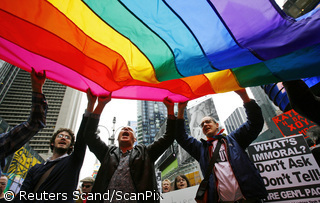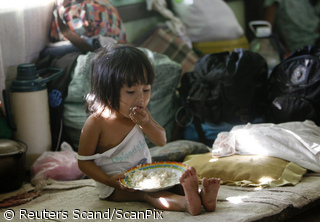The Orthodox church will on Sunday take the unprecedented step of canonizing someone already revered as a saint by Roman Catholics, amid ceremonies marking Hungary's millennium as a nation state.
Published:
22 August 2000 y., Tuesday
Constantinople Patriarch Bartolomaios I will formally announce the decision of the Orthodox bishops to canonize Stephen I -- Hungary's founding monarch -- as an Orthodox saint, Cardinal Istvan Paskai told reporters this week.
Stephen I, the ruler of Hungary between 997-1038, was canonized by the Catholic Church in 1081. During his lifetime he campaigned to convert and settle nomadic Hungarian tribes and asked to be crowned by Pope Sylvester III, setting up a Christian state here in the year 1000.
Religious fervor is expected to grip Hungary from Sunday, when nationwide celebrations begin to mark the 1,000th anniversary of the foundation of their nation.
Precious relics -- fragments of the skull of Saint Stephen I (969-1038 AD) and his right hand -- arrived earlier this week on loan from a monastery in Dubrovnik, Croatia, where they have been kept for at least the past 450 years.
And after a break of 62 years, a Papal legate will attend the celebrations. Cardinal Angelo Sodano, representing Pope John Paul II, will read out a message from the pope to the Hungarian people.
Some 67 percent of Hungary's population of 10 million are Catholics, with only a minority in the Orthodox church. There was a rejuvenation of all religions when multi-party democracy was restored in Hungary in 1990, following 43 years of persecution under the Soviet satellite regime.
St. Stephen's relics will be carried in a procession through the streets of Budapest on Sunday and into the parliament building where the monarch's crown is on display.
Šaltinis:
Central Europe Online
Copying, publishing, announcing any information from the News.lt portal without written permission of News.lt editorial office is prohibited.
The most popular articles
 Tiwonge Chimbalanga and Steven Monjeza are married, but in Malawi homosexuality is banned.
more »
Tiwonge Chimbalanga and Steven Monjeza are married, but in Malawi homosexuality is banned.
more »
 The World Bank today launched the fourth book in the critically acclaimed Moving Out of Poverty series, which provides bottom up perspectives on poverty and local realities by over 60,000 people living in 500 communities in 15 countries.
more »
The World Bank today launched the fourth book in the critically acclaimed Moving Out of Poverty series, which provides bottom up perspectives on poverty and local realities by over 60,000 people living in 500 communities in 15 countries.
more »
 Ten years ago, European leaders pledged to end poverty in the EU by 2010. As this deadline approaches, the goal is still some way off.
more »
Ten years ago, European leaders pledged to end poverty in the EU by 2010. As this deadline approaches, the goal is still some way off.
more »
 For many 2009 will be a historic year with the coming into force of the Lisbon Treaty, the outcome of the Copenhagen summit and the inauguration of the first black US president.
more »
For many 2009 will be a historic year with the coming into force of the Lisbon Treaty, the outcome of the Copenhagen summit and the inauguration of the first black US president.
more »
 Not answering the phone, celebrating Hogmanay and reading Dickens' Christmas Carol are just three seasonal traditions that MEPs shared with us.
more »
Not answering the phone, celebrating Hogmanay and reading Dickens' Christmas Carol are just three seasonal traditions that MEPs shared with us.
more »
 More and more people make their homes and own property in EU countries other than the one in which they hold citizenship.
more »
More and more people make their homes and own property in EU countries other than the one in which they hold citizenship.
more »
 European Parliament President Jerzy Buzek has made an televised Christmas and New Year address to European citizens, looking ahead to the challenges of the coming year.
more »
European Parliament President Jerzy Buzek has made an televised Christmas and New Year address to European citizens, looking ahead to the challenges of the coming year.
more »
 Lithuania takes the 1st position in the EU by the number of students in the country.
more »
Lithuania takes the 1st position in the EU by the number of students in the country.
more »
 Sergei Kovalev, former political prisoner turned activist for Russian human rights group Memorial gave an emotional and heartfelt address to the European Parliament on Wednesday 16 December.
more »
Sergei Kovalev, former political prisoner turned activist for Russian human rights group Memorial gave an emotional and heartfelt address to the European Parliament on Wednesday 16 December.
more »
 Strengthened passenger rights for travel by bus are an important item on the agenda when the Transport, Telecommunications and Energy Council (TTE) meets on 17–18 December.
more »
Strengthened passenger rights for travel by bus are an important item on the agenda when the Transport, Telecommunications and Energy Council (TTE) meets on 17–18 December.
more »